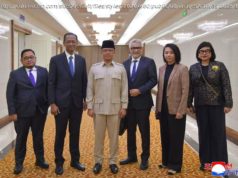Any deal will depend on something that’s in short supply on the Korean peninsula – trust.
North Korean leader Kim Jong Un has pledged to dismantle his nuclear test site, and supposedly, he’s even inviting the international press into his usually off-limits kingdom to witness the extravaganza. The gesture is meant to prove he’s serious about eliminating his weapons program – and he wants all the world to see it.
But be warned: This could be a show of the dog-and-pony variety. Some experts claim the site has already been pulverized by previous tests and is now of little use. If that’s the case, Kim’s move, at best, may be merely symbolic; at worst, it could be a ruse, meant to convince a hopeful world that he’s ditching his nukes when he’s not. How can we know what the truth really is?
And here we find the one factor that may kill off any nuclear deal with North Korea: verification.
The U. S. and South Korea will need to be assured the North Koreans are doing what they say they’re doing. Any agreement will have to include some sort of process to inspect Pyongyang’s nuclear facilities and verify that every aspect of Kim’s weapons-making program has been eliminated.
White House officials are making a big point of this issue. Newly minted Secretary of State Mike Pompeo said recently the U. S. wants “complete, verifiable, irreversible denuclearization. »
That won’t be easy.
The North Koreans, like expert magicians, have shown themselves adept at making the world think their nuclear program is disappearing, when it’s actually just hiding backstage. Kim’s test-site performance feels all too familiar to a stunt his father, Kim Jong Il, pulled a decade ago.
Back then, Pyongyang blew up the cooling tower at the country’s main nuclear reactor, with CNN cameras dutifully broadcasting it to Washington. That, too, was supposed to be a symbolic act to show Pyongyang’s commitment to giving up its nuclear program. A year later, Pyongyang conducted its second nuclear test.
The verification problem was one key reason why the first major attempt at denuclearization failed, too.
In 1994, the Clinton Administration struck a deal with Pyongyang under which the U. S. would build two nuclear reactors for North Korea (which couldn’t easily produce the material necessary to make bombs) in return for the closure of its existing facilities (which could) and an end to its weapons development.
The deal broke apart in the early 2000s amid mutual recriminations. The causes of the collapse were complex, but at its core was uncertainty over whether North Korea was abiding by its agreement. Washington had become convinced Pyongyang was cheating by secretly continuing its nuclear weapons program. Making matters worse, the North Koreans bred suspicion by being uncooperative with the International Atomic Energy Agency, which was tasked with monitoring aspects of Pyongyang’s compliance.
To make any new deal work, Kim will have to pull the curtain away from his entire nuclear program. Inspectors will have to be allowed into every nook and cranny. There’s no guarantee Pyongyang is going to be willing to allow this – any sovereign state would be troubled by such a prospect. But even if it did, being certain – absolutely certain – Kim isn’t hiding something in an unknown, undisclosed facility somewhere would be extremely difficult.
So it’s really just a matter of when, not if, the verification conundrum becomes a sticking point as negotiations move forward. Wary of past failures, Washington is already intent on demanding Kim substantially dismantle his program before he gets any significant relief from international sanctions – which means verification becomes a critical matter from the get-go. If anything, President Donald Trump’s concerns about the nuclear agreement with Iran will only heighten Washington’s well-aroused suspicions that North Korea could try to cheat.
In the end, any deal will depend on something that’s in very short supply on the Korean peninsula – trust. To the North Koreans, the U. S. is an imperialist monster bent on wiping their country off the map. To the Americans, North Korea is a rogue state that has repeatedly threatened U. S. security and deceived them before.
Bridging this chasm with hard rules on inspection and verification that can be accepted by both sides seems a near impossibility. This latest North Korea show might close on opening night.
To contact the author of this story: Michael Schuman at contactschuman@gmail.com
To contact the editor responsible for this story: Katrina Nicholas at knicholas2@bloomberg.net






